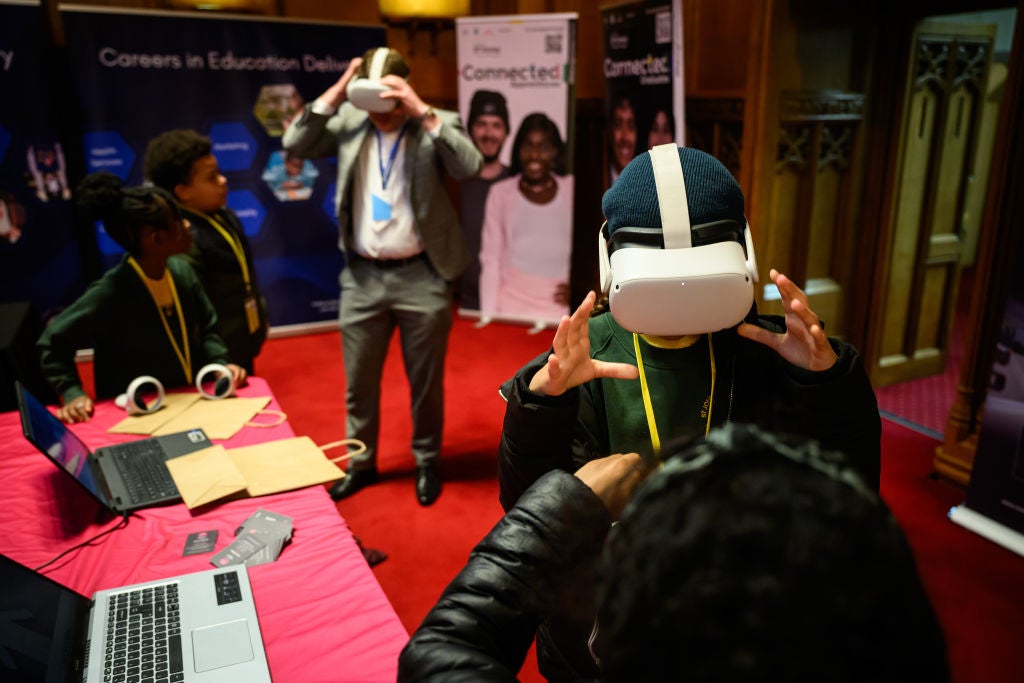
The metaverse has been hailed as one of the biggest trends in the technology industry this year. Tech evangelists have sermonised about the next stage of the internet ever since Mark Zuckerberg restructured the Facebook empire under the Meta brand in October, 2021.
Everyone from gaming companies and manufacturers to drinks brands and healthcare businesses vied for a slice of the new digital frontier. Companies like the studio behind Pokemon Go, tech titan Microsoft, chipmaker NVIDIA, Fortnite developer Epic Games, and Disney have all announced metaverse pushes of their own.
Research and intelligence company GlobalData’s monitoring of public company filings has recorded more than 4,300 mentions of the metaverse in the first quarter of 2022, an increase of 223% from the last quarter of 2021 and 106% higher than the annual total for 2021.
Clearly, interest in the virtual world has exploded, at least among some companies. Against that background, any suggestion that a metaverse winter is inbound might seem incongruous. However, iconoclastic as it might sound, analysts increasingly warn that a cold snap is likely to descend – ironic given that the metaverse originated as a phrase in Neal Stephenson’s 1992 book Snow Crash.
“The next year will [see the arrival of] the metaverse winter as a moment [where the market segment] kind of retreats,” Emma Mohr-McClune, analyst at GlobalData, said in a new podcast from the research firm.
Are we facing a metaverse winter?
Part of her trepidation about a metaverse winter stems from Meta itself. The social media giant has arguably spearheaded the push into the digital realm ever since it announced its pivot last year. It has not been idle in months since.
How well do you really know your competitors?
Access the most comprehensive Company Profiles on the market, powered by GlobalData. Save hours of research. Gain competitive edge.

Thank you!
Your download email will arrive shortly
Not ready to buy yet? Download a free sample
We are confident about the unique quality of our Company Profiles. However, we want you to make the most beneficial decision for your business, so we offer a free sample that you can download by submitting the below form
By GlobalDataIn 2022, it has helped launch so-called metaversities to bring students into the metaverse, partnered with chipmaker Qualcomm and kicked of humongous marketing campaigns in order drum up interest in the metaverse.
Nevertheless, there are dark clouds on the horizon for Meta. Firstly, some detractors have suggested that the company’s pivot is just another attempt by the Zuck to kickstart his ailing virtual reality (VR) and augmented reality (AR) business.
Secondly, launching into a new digital realm may help it get new users after its legacy platforms, such as Facebook, have been bleeding users. However, the metaverse doesn’t rid it of regulatory scrutiny in regards to things like data privacy. Meta’s track-record of privacy scandals is sure to give many people pause about how it will fare in the metaverse.
It’s also unclear how Meta will tackle misinformation in the metaverse, having struggled with the proliferation of fake news on its platforms for years.
The third problem for Meta its stocks have been in free fall this year. The company has lost over $600bn of its market cap this year. The plummeting stocks are, just like many other tech companies, due to Meta having over-estimated how sustainable the growth they enjoyed during the pandemic would be.
As a consequence, Meta is one of the many tech companies that have announced mass-layoffs over the course of 2022.
It also hasn’t helped that Zuckerberg’s disastrous metaverse presentations have been universally panned for its stunted and tone-dead deliveries.
Against this background, it’s unsurprising that investors recently told the Meta CEO to spend less on the metaverse and focus more on its core business.
“[We’ll] see what happens if Neta’s shares [continue to] plunge and investors kick off a storm and want to know what he’s doing with [the] $100bn investment and when they’ll see some kind of monetisation from it,” Mohr-McClune said.
It’s not just Meta
Meta’s struggles aren’t the only factors pointing towards a metaverse winter. A look at Google searches shows that interest in the nascent industry skyrocketed in the months following Meta’s rebrand, it has plummeted since March this year.
Looking at the numbers from Google, they represent search interest relative to the highest point on the chart for the given region and time. A value of 100 is the peak popularity for the term. A value of 50 means that the term is half as popular. A score of 0 means that there was not enough data for this term.
Up until April 2021, global searches in the metaverse stayed around a one. There was a flurry of activity in that month that pushed interest to an eight, before searches dropped again. They reached their peak in October 2021, reaching a 100. It then dropped over the following month down to 19 in July. There have been some fluctuations, but interest is currently at that level too.
Investment falls
Then, if we look at investments into the sector, we can see that those have dropped as well. VR and AR are often seen as key technologies in the future of the metaverse. Investment into these sectors should provide an indication about the interest in the new digital paradigm.
The number of VR and AR deals carried out each year has increased steadily over the past decade, according to data accessed from GlobalData earlier in December. Back in 2012, the industry secured $223m across 11 deals. Those figures jumped over the next few years.
The growth of the deals in the AR and VR space reached their peak in 2021. That year the industry secured north of $18.9bn across 311 venture financing, private equity, equity offering and equity offering deals.
However, the VR and AR industry has not remained unscathed from the market turmoil. The number of capital raises in the sector has plummeted this year. Just over $5bn have been raised by VR and AR projects this year across 283 deals.
While the crashing numbers in themselves don't meanthat the virtual worlds envisioned by Zuckerberg will not happen, they contribute to the forecast of a metaverse winter
Mohr-McClune believes the following months will se more "niche players" emerge. She also predicted an end to Apple and Google's duopoly as the leading purveyors of operating systems with the introduction of the metaverse.
"We might even need a whole new kind of operating system," Mohr-McClune said. "And unlike 3G and 4G, I think 5G and next-gen [will see] software developers [whoz9 need to understand more about how to control the latency of those networks, which means what [that] the carriers are gonna have to interface with the developers in a different way. And if we do end up having a new whole new operating system for the metaverse, the carriers must be involved. So that's something that we're going to be very interested in covering next year."
GlobalData is the parent company of Verdict and its sister publications.






